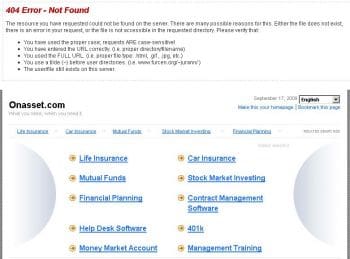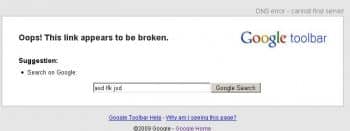Some web hosting companies have now taken it to a new low: they are monetizing (making money) from your web site without your knowledge. Web hosts are now hijacking their customers’ 404 error pages and putting up a slew of paid ads: advertisements, when clicked, make the company money. And most web site owners don’t even know that this is happening to them. It could be happening to you, on your web site, and you don’t even know it. It looks like this:

Google recently was caught hijacking 404 error pages when the users have installed their Google Toolbar. They do not make any money from these 404 errors, Google “helps you” by allowing you to easily search for something:

What Google is doing could be considered “ethical” since they’re not making any money from these user errors. But what your web hosting is doing is not right. Let me explain, in more detail, what is happening and what is becoming an increasingly common practice in the web hosting industry:
When you set up a website, you pay for two things: a domain name and web hosting. A domain name (like www.BillHartzer.com) must be registered at an official Registrar. You then need pay another company, a web host, to “host” your web site’s computer files, the files that sit on a web server, the ones that are requested by web browsers when someone comes to your web site.
An expired domain name (or a parked domain name) at GoDaddy.com looks like this:

Many people register domain names but never actually set up web hosting for them. It is common practice now for domain name registrars to automatically put up “domain parking” or “landing pages” on those domain names that aren’t currently be used. The domain Registrar makes money when someone clicks on a link: these links are actually paid ads that usually come from an affiliate partnership with Google AdWords or Yahoo! Search Marketing. The domain name owner has NOT told the registrar where they want their domain name to “point”, like to a web host where they actually have a web site up and running. Some people, typically called “Domainers”, will register or own a domain name and then point the domain name to a domain name parking service that puts up the ads on behalf of the domain owner: and the domain owner shares the click-thru revenue with the domain parking company.
I believe it is totally acceptable for a registrar to put up a “domain parking page” and monetize that web page (make money from it) if the owner of the domain name does not specify where they want the domain to point. If the domain name owner isn’t using the domain name for a live web site and they aren’t using the domain name to earn domain parking revenue themselves, it is okay for the domain registrar to monetize it as long as they indicate something on the web page (like it’s an expired domain or that the domain owner has not set up a page on it, etc.).
Another way that some ISPs (the company you pay for internet access) make money is at the router or ISP level (you as a customer have no control over this). If you are browsing the web and you type in a domain name that doesn’t exist, companies like Time Warner and Embarq might put up a web page telling you that the web address is not correct: and they may put up click-thru ads on the page, giving the ISP a chance to make money.
But what if you have bought a domain name, you are pay a web host good money to host the web site for you–and your web site is live. People are going to it and the web site has a lot of visitors. Does your web host have the right to automatically display advertisements on your web site (on your domain name) when one of your visitors goes to a page that doesn’t exist on your web site?
Absolutely not. This is where I personally draw the line. It’s your web site and you should have a choice when it comes to whether or not your web hosting company makes money from your web site. I was absolutely appalled when I recently found that web sites hosted by Ecommerce.com are having their 404 error pages hijacked like the image I show at the top of this blog post.
Your web host, the company that you pay for web hosting, actually thinks that it is “okay” for them to make money from their customers’ web sites’ 404 error pages. Granted, in this case, the web host, IX Web Hosting, owned by Ecommerce.com, has taken website monetization to a new low. There are about 300,000 web sites hosted on the ixwebhosting.com nameservers.
I was very interested in the legality of this, and it turns out that apparently it has been added to the Terms of Service
:
XXII. Non-Existing User Pages
IX Web Hosting reserves the right to supply content-enriched pages, including but not limited to search engines, advertisements, directory links, etc., for non-existent user pages that are served by IX Web Hosting to requesting sources. These pages include error pages (i.e. 404 Not Found), new account place-holder pages, unused domains and suspended user sites.
All users of IX Web Hosting services have the option of creating their own error pages and content pages. Unless created by the user, such pages will default to the IX Web Hosting provided content.
Ecommerce.com / IX Web Hosting is not the only web host doing this, some of the largest web hosting companies, such as Lunarpages, are also hijacking their customers’ 404 error pages.
Technically speaking, you do have the right to change your 404 Error Page on your web site, and it’s called setting up a “custom 404 error page”. If you are using WordPress on your web site as a CMS or as a blog, then you probably already are taking care of your 404 error page. From my experience, about 98 percent of web sites do not have custom 404 error pages, and the majority of web site owners don’t even know that they can make one.
What do you think? Does a web host–someone you pay for web hosting–have the right to monetize your website without your knowledge?